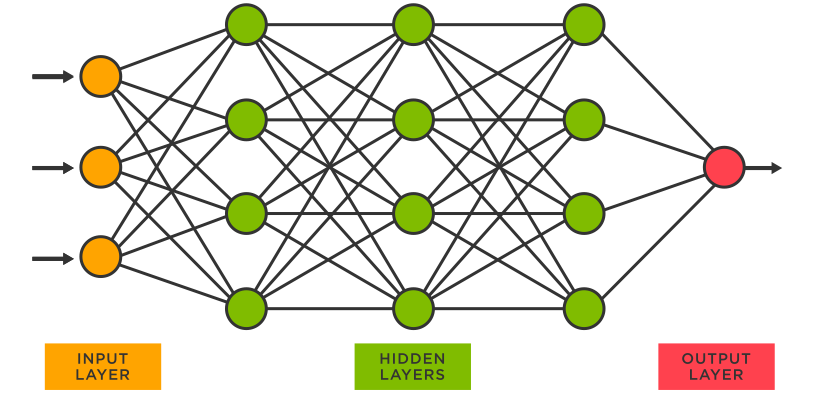 |
Introduction to Deep Learning
Dept. of Electrical Engineering
University of Notre Dame
Spring 2025- Enroll in Course Number EE 60572-01
Location/Time DBRT 303 - TTh 2pm-3:15pm
Office Hours - Fitz 266 - T/Th 10-12
|

|
|
Description: This is a survey course on deep learning for first year engineering
graduate students. The course topics include 1) training pipelines for neural network models, 2) Convolutional Neural Networks
for Image Processing, 3) Recurrent and Transformer Models for Sequence Data, 4) Generative Models (Autoencoders, GANs, and Diffusion), and 5) Security/Fairness in Machine Learning.
The course will make extensive use of TensorFlow/Keras deep learning libraries.
Grading: Grades will be based on 8 Homework assignments (40%). There will be two in-class midterms (30%)
and final exam (take home) or project (30%). Project will be final paper/notebook subject to instructor approval. Homeworks and Exams will be a combination
of essay questions, traditional problem solving, and programming exercises.
Prerequisites:Students should have prior course work in linear algebra and random processes. Students must have prior Python
programming experience. Students will use TensorFlow/Keras deep learning libraries and will be customizing class objects used to instantiate and train
deep neural network models.
Project Option: Students may elect to do a project with instructor's approval.
Projects will be individual student efforts (no teams). See instructor as soon as possible if you are interested in the project option.
Instructor approval will be contingent on a satisfactory project proposal (due before Spring Break).
The project grade will be used in place of the final exam grade. Project proposal and final report must be written using
ICML latex style files (zip) (docx)
|
Textbooks:
- (Required) Dept. of EE, University of Notre Dame,
Introduction to Deep Learning, lecture notes 2025
-
(Recommended) Francois Chollet, Deep learning with Python, 2nd edition, Manning, 2021.
-
(Suggested) Ian Goodfellow, Yoshua Bengio, Aaron Courville,
Deep Learning, MIT Press, 2016
-
(Suggested) Richard Sutton and Andrew Barto,
Reinforcement Learning: an introduction,
second edition, MIT Press, 2018
-
(Suggested) David Foster,
Generative Deep Learning
, second edition, O'Reilly Media, 2023
-
(Suggested) Solon Barocas, Moritz Hardt, Arvind Narayanan,
Fairness and Machine Learning: limitations and Opportunities, MIT Press, 2023.
|
TOPICS
- Introduction - Learning by Example
- Generalization - a statistical approach
- Neural Networks Models
- Deep Neural Network Training Pipeline
- Convolutional Neural Networks
- Recurrent Models and Transformers in Natural Language Processing
- Models for Generative AI
Security/Fairness in Machine Learning
|
Online Resources
-
Google's CoLaboratory: Google's online service for running Deep Learning scripts.
-
Python 3: Main Programming Language used throughout the course.
-
Jupyter Notebook: Programmer's Notebook used to interactively run scripts.
You may also be able to use Code Visual Studio.
-
TensorFlow 2: One of the major Deep Learning Software Frameworks this course is based on.
-
Keras Deep Learning Library: One of the major deep learning API's built on top of TensorFlow
-
GitHub: a web-based interface that uses Git, the open source version control software that lets multiple people make separate changes to web pages at the same time. This website
has the source code for a number of open source deep learning projects; including, tensorflow, keras, and gym.
-
Overleaf: Online Latex site - access through University login. Learn Latex in 30 minutes
-
TexLive distribution (for those who want Latex on their machine)
|
Online Datasets
-
Kaggle datasets and online ML community:
Fashion-MNIST (70MB zip),
Jena Climate (13.6 MB zip),
Cats/Dogs (116MB zip file),
SMS Spam Collection Database (425KB zip)
-
Stanford AI lab datasets:
aclImdb(84MB tar.gz)
- Anki Language Datasets:
Spanish/English (5.4MB zip),
French/English (7.9MB zip),
German/English (10.4MB zip),
Persian/English (153KB zip),
Chinese/English (1.3MB zip),
Turkish/English (5.5MB zip),
Portuguese/English (6.5MB zip)
- Oxford Datasets:
Oxford III-T Pets (1.64GB zip),
Flowers 102 (360MB zip)
- TensorFlow Datasets:
- GLoVe Datasets:
Glove 6B 100d (134MB zip)
-
CUHK Multimedia Lab :
CelebA Dataset(1.53 GB zip)
- UCI Irvine Machine Learning Repository:
Adult Dataset (634 kB zip)
|

